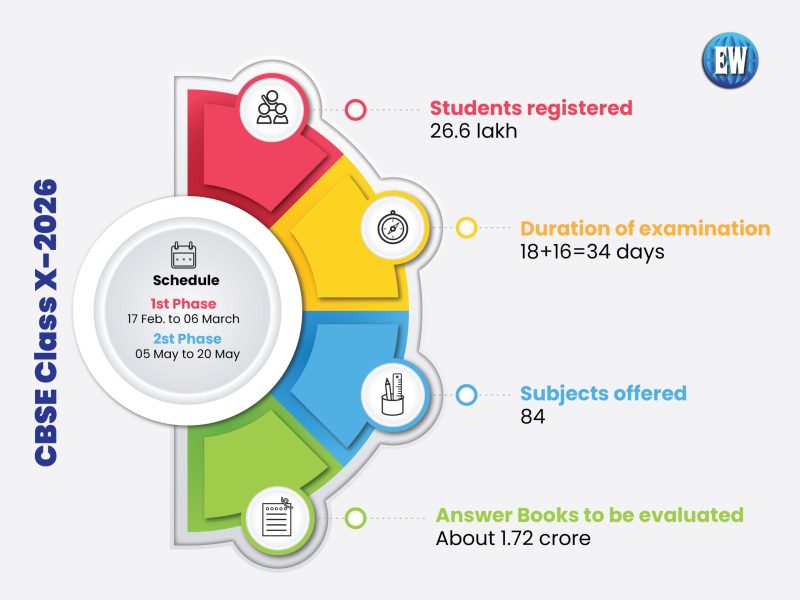Come 2026, the Central Board for Secondary Education will allow students flexibility to choose between two board exams for class X. While the first one will be held in February 2026, the other will be in May 2026. Candidates will have the option to appear for both examinations if they wish.
In a public notice on February 25, the board has said that this is in line with the recommendations of the National Education Policy that proposes to give students an opportunity to improve their performance in Board exams. The NEP proposes that such a move will minimize the ‘high stakes’ aspect and curtail the need for students to seek additional coaching in the same of board exams.
It has been envisioned to give students greater flexibility, making a choice while considering the best of the attempts testing the core capabilities of students.
The CBSE has, on its website, published a draft of the policy which is open to stakeholder feedback.
Here are some highlights of the draft:
- Both the examinations will be conducted on the full current syllabus and the textbooks.
- Except Science, Maths, Social Science, Hindi, English, rest of the subjects are grouped as (i) A Regional and Foreign languages in one group (ii) Rest of the subjects in one group
- Examination of Science, Maths, Social Science, Hindi and English will be conducted on a fixed day as done currently.
- Examination of Regional and Foreign Languages will be done in one go on a single day.
- Examination of the remaining subjects will be conducted 2 to 3 times based on the choices of the students on 2 or 3 days. Meaning thereby, the Data Science examination will be conducted on two or three days. The students will be allotted the day of the examination based on the formula devised by the CBSE and the subject combination offered by the student. Students will not be given a choice to select the dates of examinations. The question papers of these subjects will be taken back from the students after examination is over
- No passing document will be issued after the result of 1 st examinations.
Performance of 1 st examination will be made available in DigiLocker. This could be used for admission to class XI if the student does not wish to appear in 2nd examination. - All the candidates will be issued passing documents after the second examination result.
- Practical/ Internal assessment will be done only once.Mark Sheet cum Passing Certificate will have marks secured in the first examination, the second examination, marks secured in Practical/Internal assessment and Grades. Also, better of the two marks will also be mentioned.
- Students not qualified in the 1st examination could be allowed admission in Class XI and based on the result of the 2nd examination, their admission be finalised.
- Students qualifying all 5 subjects will be declared as pass.
- Students who failed to pass from 1 to 5 subjects in 1st examination will be placed under the “Improvement Category” and will be allowed to appear in 2nd examination
- If a student is declared pass by replacing the 6th/7th subject will be eligible for improvement in the failed subject only for the next two examinations from their 1st examinations.
- Students who failed to pass from 1 to 5 subjects in 1st examination will be placed under the “Improvement Category” to be held in July 2026.
- For students appearing only in the 2nd exam, no further examination will be conducted. They will be allowed to appear in the 1st examination of the subsequent year, but the syllabus shall be the syllabus applicable for the subsequent year.
- After the feedback, the policy will be reviewed, revised and finalised.
Anitha Bijesh, Principal of Delhi Public School, Bengaluru South said that having two board exams will be highly beneficial for students. “It helps in reducing stress by giving them a second chance to improve. This system empowers children, giving them agency and authority over their performance, which can lead to better results and learning outcomes. From an educator’s perspective, however, it requires careful planning in terms of resources and logistics. Schools will need to manage scheduling, faculty workload, and additional assessments efficiently to ensure smooth implementation of the system. We will still have to work it out.”
Dr Bhuvaneswari Jayaraman, principal, Presidency School said “When we talk about testing less but the number of days of testing will increase. Even if there is a one day gap between the exams, 34 days out of the 10 months will go for exams alone. Schools manage to spare eight to nine months a year for academics apart from the events, holidays etc. It will be a challenge for us to navigate but we need to wait and see how it helps students perform. Continuous evaluation is important. Students also have mixed feelings about it. While some students think one exam attempt is better, others think it will help. How will it improve the performance is the question on their minds now.”
Posted in National, News























